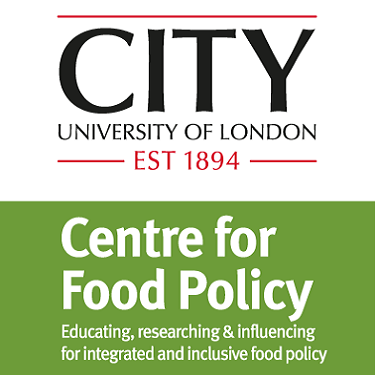This Dispatches post is written by Helen Strong, Jack Fargher and Viivi Oinonen, students on the Centre’s Food Policy Masters Programme.

Every year, the 7 food-related City of London Livery companies (the Worshipful Companies of Bakers, Butchers, Cooks, Fruiterers, Farmers, Fishmongers and Poulters) organise the City Food Lecture in Guildhall in London. Students from the Centre for Food Policy and across the UK have been invited for several years to attend both the lecture and a special student visit to a major UK retailer or supplier. This year’s ‘behind the scenes’ visit was to the Marks & Spencer headquarters giving us a sense of the inner workings of a major food retailer and an opportunity to learn how food policy is being formed, followed and understood by today’s retailers and suppliers.
An inside view
 Battling through the Beast from the East, we arrived at M&S HQ where we were introduced to ‘Plan A’ – a sustainable business strategy that includes multiple commitments to address the key environmental, social and ethical challenges facing M&S. Ranging from climate change, health and food waste, one of the key goals of Plan A is to work collaboratively with other retailers, manufacturers and government on government recycling policy and to ensure that all M&S packaging is ‘widely recyclable’ by 2022.
Battling through the Beast from the East, we arrived at M&S HQ where we were introduced to ‘Plan A’ – a sustainable business strategy that includes multiple commitments to address the key environmental, social and ethical challenges facing M&S. Ranging from climate change, health and food waste, one of the key goals of Plan A is to work collaboratively with other retailers, manufacturers and government on government recycling policy and to ensure that all M&S packaging is ‘widely recyclable’ by 2022.
We were also given a broad overview of the technologies and processes used by M&S to ensure both quality and food standards are met and measured for their beef products. M&S are able to use DNA traceability for all of their products containing beef due to the size of their operations which raised an important question; how far can retailers grow and still maintain detailed knowledge of, and control over, their supply chains in order to ensure food quality and standards?
At the end of our visit, we had the opportunity to speak with the senior management (mainly food technology) team regarding food policy issues ranging from Brexit to sustainability, as well as consumer trends. It was refreshing to be faced with a predominantly female panel at this point – something that the City Food Lecture should take note of for their own panellist selection, key note speakers and guest list in subsequent years!
Industry and influence

At the Guildhall, Mr John Giles (Chairman of the City Food Lecture) spoke about the historical and present roles of the Livery Companies, with Dean Holroyd (Group Technical and Sustainability Director of ABP Food Group) speaking about his diverse experience within the food sector. We were then joined by the evening’s panellist members; Julia Glotz (managing editor of The Grocer), Dr David Hughes, (Emeritus professor of food marketing at Imperial College London) and Peter Kendall (former president of the National Farmers Union and chairman of the Agriculture and Horticulture Development Board). Touching on food waste, ever-evolving consumer trends and farming in the UK post-Brexit, these discussions highlighted the enormity of the food industry and diverse range of stakeholders attempting to influence the direction of policy and the market.
Lastly, we were joined briefly by the keynote speaker, Mr Dave Lewis (CEO of Tesco Group), who detailed his career and how it had taken him from Unilever to Tesco. Such an exclusive audience with the keynote speaker was a novel occurrence at the City Food Lecture and an exceptional opportunity for us students! It also highlighted the power that individuals and single organisations can have in shaping food policy.
Sustainability – what does it mean?

Dave Lewis, CEO Tesco Group
The evening lecture took place in the Guildhall’s Grand Hall, a centuries old room filled with marble statues, ornate stained-glass windows and wooden chairs just big enough for 21st century bodies! As the 500-strong audience sat down and the livery company masters were introduced, Dave Lewis spoke about supplier partnerships and the future of food. Using his tenure at Tesco as a case study, he spoke about the difficult changes needed throughout the food system if sustainability is to become a key priority.
Discussions about food waste, improving recycling to close the packaging loop and better commitments to buying farmers stocks in times of glut, were issues framed by Lewis both in terms of environmental sustainability and economic sustainability. The corporate sector, he argued, can benefit from the latter if the former is introduced, with Tesco’s intention to provide sustainable, healthy and affordable food to the masses arguably testing how truly sustainable the corporate sector can become.
The role of the private sector in food policy
In thinking more broadly about the challenges we face with our food system, the event prompted us to question the role of the private sector in addressing these. More specifically, to think about the role of retailers given the visit to M&S and the presence of Dave Lewis at the City Food Lecture.
The dominant position in our food system held by Britain’s large retailers is significant, and arguably in some cases, unparalleled. As such, a certain amount of responsibility lies at their door. With tremendous levels of expertise, logistical capacity and influence, the potential for this sector to bring about real change within our food system is enormous. However, it is the ‘certain amount’ of responsibility that comes in to question here.
Some of the environmental, social and health-related challenges that we face as a result of our current food system can be directly linked to the modus operandi of the food retail sector, such as food waste and the sustainability of packaging. Others, are less explicitly the result of retailers’ operations but are certainly linked; such as the obesity epidemic and biodiversity loss. How far then, should they take responsibility for these challenges, and who should hold them accountable for doing so?
As we learned during the day, there is considerable effort from the retail sector to address some of the challenges we mention above, and the capability and commitment to this that we saw from the M&S team is an invaluable asset to making progress in these areas. However, retailers are businesses who must maximise financial return and shareholder value. This economic motive is also part and parcel of the way they address environmental, social and health issues.
Another matter for consideration is that of consumer demand – the driving force behind product development and the types and range of foods stocked. This year, M&S have 9 different varieties of hot cross buns on their shelves. Who and what shapes this demand?!
Where people are becoming more health-conscious or aware of the environmental impact of certain foods, retailers are responding; for example, through the reformulation of ready meals to reduce fat, salt or sugar, increasing the range of vegan products on the shelves or making imperfect fruit and vegetables available. These demands largely stem from increased public awareness of the broader issues at stake. If it is consumer demand that shapes what is available to us in shops, could retailers not do more through their own advertising and marketing to promote healthy, sustainable diets and do more to actively discourage less healthy, less sustainable diets?
From what we learned during our fascinating day, there is lots of good will and plenty of steps being made in the right direction, whatever the motive behind this activity. But a pervasive thought remains. Reducing food waste through donations to food charities; improving the recyclability of packaging; tracing DNA to ensure food safety and standards – whilst important, it still reflects the dominant models of production, distribution and consumption that have delivered many of the problems associated with today’s food system. We need to build on the changes being made and work even harder for deeper paradigm shifts to change our food system for the better.





Leave a Reply